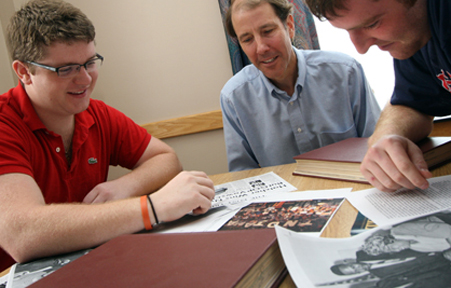 Senior George Mavrelis was working with Associate Professor of Rhetoric David Timmerman last summer when he became intrigued by two historical moments from the northwest Indiana region in which he grew up.
Senior George Mavrelis was working with Associate Professor of Rhetoric David Timmerman last summer when he became intrigued by two historical moments from the northwest Indiana region in which he grew up.
"George came to Wabash from Crown Point and had relatives who were quite familiar with the 1967 Gary mayoral election, especially the charges of corruption leveled by both campaigns," Professor Timmerman explains. "Early last summer as he was researching a 19th century African American Indiana politician, he made the connection between Barack Obama’s historic campaign and Richard Hatcher. He wanted to investigate it for himself."
Timmerman felt the resulting article—"Richard Hatcher: Turning the Tide and Passing the Torch"—was good enough to submit to Traces, the quarterly magazine of the Indiana Historical Society. The submission was ultimately turned away because the publication already had an article on Hatcher, who in 1967 became the first African American mayor of a major American city (along with Carl Stokes of Cleveland).
But Timmerman says Mavrelis’s work makes a genuine contribution to the study of Indiana political rhetoric, a rare accomplishment in papers by undergraduates in the field.
"George’s essay reminds us that, as he writes, ‘The history of racial, political and social equality in Indiana, particularly in northwest Indiana, has been a turbulent one, stained with many occurrences of injustice and hate.’ This made the strong showing by Barack Obama in 2008, including in Lake County, all the more significant," Timmerman says. "Also, I tend to agree with George concerning the importance of Hatcher’s election—it could certainly be said that if Barack Obama wins the presidency this fall he will be completing something begun by Richard Hatcher in the state of Indiana."
With Indianapolis Star political reporter Matthew Tully writing in his October 8 column that the 2008 Presidential Election could be decided in Lake County, Mavrelis’s work is even more timely.
"It is just as George discovered—a pattern that began decades ago, repeating itself," Timmerman says. "Most Hoosiers possess a well developed ability to laugh at ourselves, including the state moniker of 'flyover state.' There is some truth to that, but it hides the many ways in which this state has played a role in significant and singular events in this country, including the election of the first African American mayor of a large, northern city and, perhaps, the election of the first African American President."
For Mavrelis, a mathematics major/biology minor who plans to attend law school next year, the article provided "an opportunity to work one-on-one with a professor of rhetoric on a project that took weeks of research to discover.
"I had never worked so closely with a professor on my writing style, which is such an essential skill for a senior approaching graduation. Now I have a greater confidence in my writing."
Timmerman says Mavrelis "learned what it is like to take a project from scratch to fully completed essay, including several false starts, redirections, and a process of editing that saw his essay go through six drafts. I also think he learned the benefit of conversation and collaborative research, as he and I combed through the same sources at the historical museum and state library and brainstormed ideas in the car, at lunch, and in the library.
"I was reminded that students are often best motivated by connections from their own lives and insights they have on their own."
Read Mavrelis's article here.
In photo: Mavrelis (left) looks over documents in the Lilly Library at Wabash with Professor Timmerman and fellow intern Derek Hickerson ’09. An article on James Matthew Townsend by Hickerson will be published in the Winter 2009 issue of Traces. We'll have more about Derek’s work closer to the Traces publication date.)